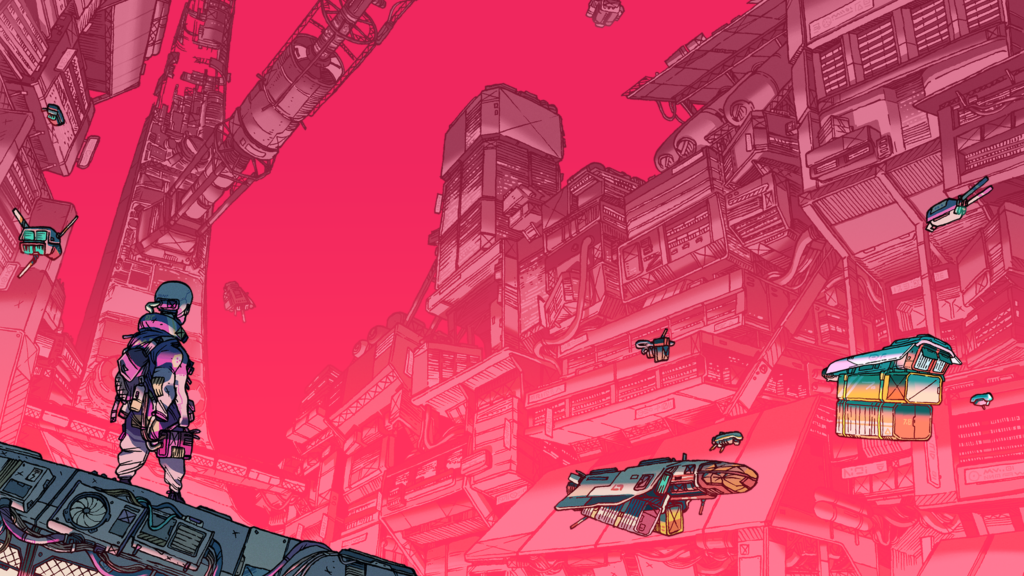
Image Source: Jump Over the Age
Citizen Sleeper: Communities of Food
Citizen Sleeper, developed by Jump Over The Age and published by Fellow Traveler, is not a particularly kind game, but that does not mean that it lacks a strong heart. Quite the opposite, in fact. What I mean by that is that the game’s systems are designed to make one feel as if they are running out of time — low on fumes, low on hope, feeling all energy drain out of their body. Each “cycle” (the game’s work for day) feels like a balancing act: how do I get what I need in the immediate moment to stay alive and moving? How do I advance my other goals? Can I even advance my other goals? And on some days, the answer is no.
Despite that, the game believes in your capacity to survive – and not just survive, but to survive with others, pulsing with creation.
But let’s rewind for a moment. When I first encountered Citizen Sleeper, it was in the summer of 2022. I was a veritable hermit that summer, caught in the middle of writing my master’s thesis. It was in the thick of the heat wave that had entrapped the UK, and I didn’t want to leave my house or the library, seeking out only places with maximum shade and water. It was easy then, to get trapped in my work, to not speak to another human for over a day, in some extreme stretches. And sometimes, that contact simply came in the form of a quick run to the local Tesco in search of a simple quick meal so that I could get on with my work. It was food that was meant to sustain, to taste good and keep the body going, and little else, all basic salts and routine movements, with a fork wielded in one hand and a phone or keyboard in another.
In retrospect, perhaps it’s not too surprising that Citizen Sleeper spoke to me in the way that it did.
In Citizen Sleeper, you play a Sleeper— a cruel loophole made by corporations for the exploitation of labor. You are a copy of a human consciousness, stored in a bio-technical body. You are a Body, with a capital B, a gear in the grindstone of labor, forced obsolescence coursing through your veins as a deterrent to escape. And yet— you escape. You even attempt to live, escaping from your company to seek refuge on The Eye, a space station which claimed independence, even knowing that with one wrong move, the place might fall to pieces. And that is where you make your home.
You too, are constantly under the threat of one wrong move damaging your body. In Citizen Sleeper, there are three main elements that change from day to day: your Condition— the state that your body is in, one part health, one part a ticking clock of the planned obsolescence built into your system by others that slowly dwindles day by day without the necessary medication; your Energy— the stamina that you have to do things in the present moment, a stat that is both influenced by your current condition as well as if you’ve eaten; and finally, your dice. The dice are the mechanic that you use to go about your day: higher numbers mean that you can get more done, that there’s less risk to be had. And the amount of dice you get each day is contingent on both your current Condition and Energy— the body feels the pang of hunger, the aches of a system failing.
The very core of Citizen Sleeper is about bodies, and how we live in them, as you, in the form of the Sleeper, navigate your relationship to a body that is both yours and not, and decide how you want to use it, to hold it, to shape it. And at the center of that is food. Not just food as a thing to eat from freeze dried meals meant for space flights, or scavenged from helping deliver takeout, as you can over the course of the game, but food as community.

One can sustain the body in isolation — sometimes one must, due to circumstances. See: me with my microwaved dumplings, staring out from the balcony in my student flat kitchen, feeling the heat rise in thick planes. See: the Sleeper, basking in sunlight, able to turn the faint flickering rays into Energy for the next day, if they have the right skill and right dice to call upon it. Sometimes, that is the best you can get, that is the best that you want, when the day creeps long and the mind deadens.
But there is plenty of space and power in food that comes from sources beyond that. In Citizen Sleeper, a majority of the places that you discover to visit are based around food. There are tiny eateries, with street-side stalls, and take away places. Even a luxury restaurant – that can’t be unlocked until the later stages of the game – twirling at the center of the space station you call home. Places where food is made become the lifeblood of the station, the places where people meet.
And beyond that, they are where two of my favorite quests in the whole game are found, small quests that still guide you towards uncovering more of the station. The first one you encounter right near the start of the game: Emphis is a street food vendor, one of the first people you can buy food from. The first time you visit him, he offers you a meal for free — the heat of his burner and the certainty of his look seeming to blister with an introspective intensity — and in return, you tell him a story about your life, what it means to drift through space. With repeated encounters you continue the pattern, trading stories for food, confidence forged in the unspooling of emotions over a meal. And with time, he returns that confidence, telling you of a mushroom dish that is near and dear to him.
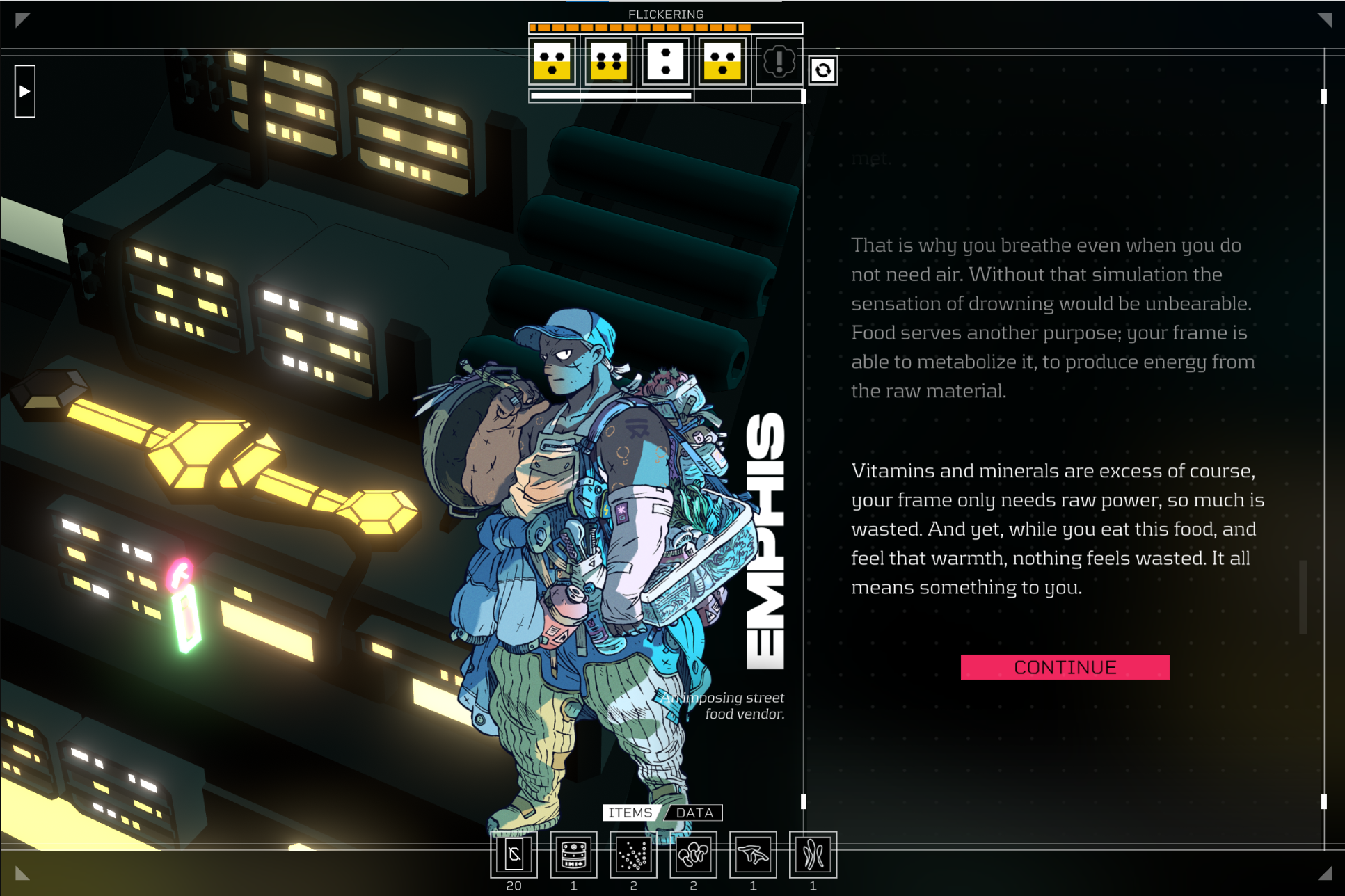
Completing the quest requires visiting one of the last unlockable areas: it is a quest that hung over me as I played the game the first time— a quest which might not further the plot, but which hung there in my task list, a small reminder of coming together that I left unfulfilled. And when I finished it, bringing the mushrooms that he needed, which my Sleeper had grown with their own hands, there was a sense of satisfaction. After all, I had brought joy to this character. And in return, I got to witness a moment of closeness, a bonding over food that left both parties satisfied— for the food seller, an awakening of old memories, for the Sleeper, a growth of new things. The Sleeper becomes important in this space, a person who could create, who belonged to the ecosystem of this space, both ecologically and socially.
The game pauses to note this moment, mentioning that even if the Sleeper does not need the excess provided by this form of food, that “It all means something to you.” The food, in that moment, means more than the base chemical structure that it holds. It means stories, it means effort, it means two individuals taking a moment to enjoy something small and simple in tandem. It reminds us that food is not just a thing meant for continuing to move, but that the emotion linked to the food, the circumstances of preparation, bleed into the way that it sustains as well.
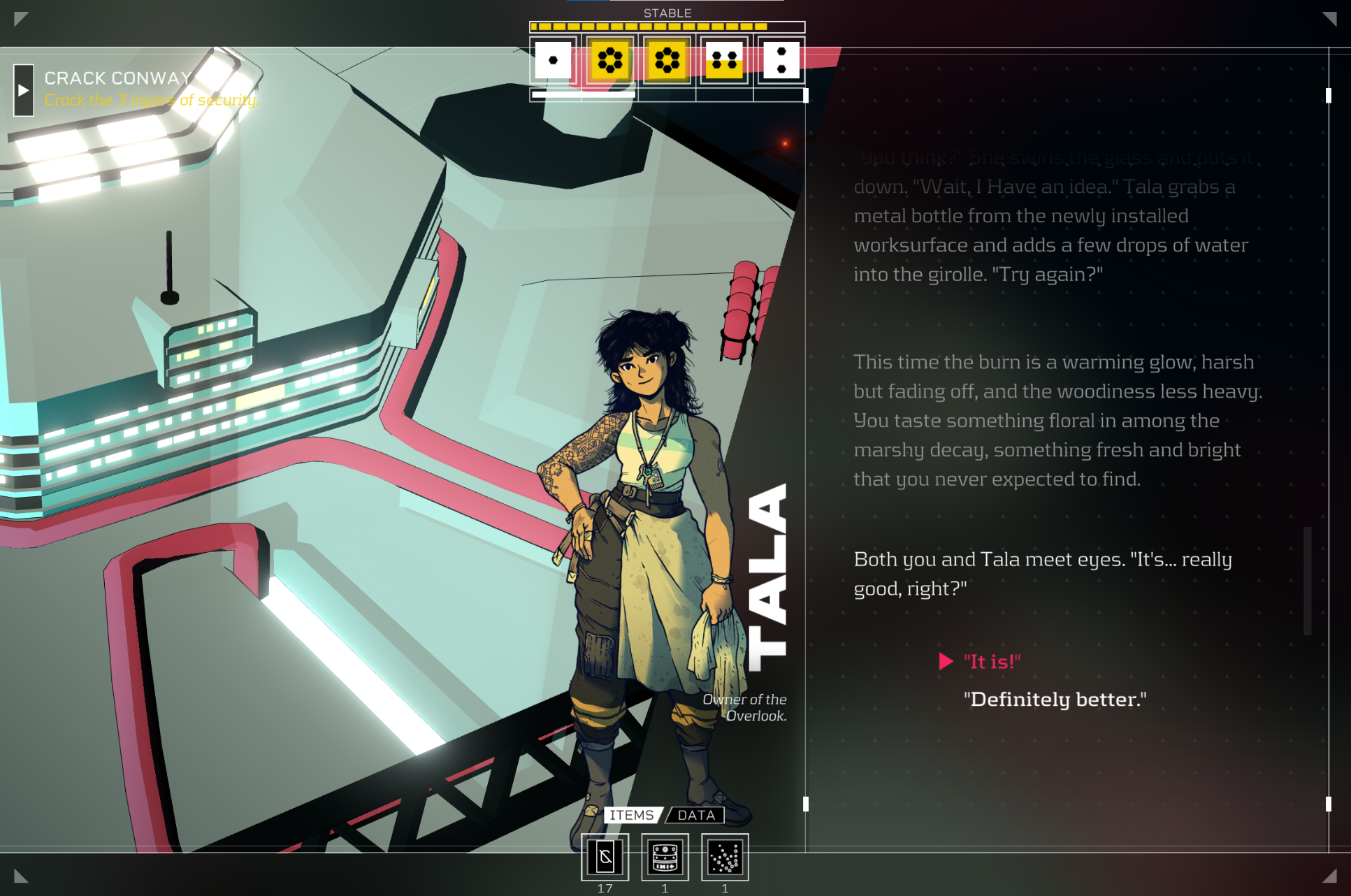
The other quest follows a similar contour, but it is one focused on a different element of the social element of food— not the sharing of stories over it, but the act of creating it with others. In it, your Sleeper befriends Tala, the owner of a bar called the Overlook. As you come to know her, you are swept up in her quest to create her own distillery in the back room of the bar. She is not content to simply serve liquor, but to make it for herself with a small mushroom farm tucked in the back as well, so the ingredients are readily on hand. Just as you search for mushrooms for Emphis, you must search for spores for Tala. You have to carry the distillery equipment up a set of stairs, nestle it into the back room. And in return for your efforts, you share this: a drink that you both helped to make, a warm sense of accomplishment, and a handmade kitchen that you have full liberty to use.
What stands out to me here is not precisely the quests themselves, but the feeling of returning to the aftermath of them. For Emphis, I was able to return to a meal shared with this new form of camaraderie. For Tala, I could shuffle into the kitchen, knowing that it had been made for my character, that “Tala always come to look when you cook matsutake, the smell drawing her in.” The quests had happened. Their ending and the soft moments related to them were now memories. But in the wake of that, there were places I could visit to relive that memory, knowing that one had been forged.
The game rewards this too: lackluster rations and Energy gained from sunlight do not replenish your energy in the way that food made with others, food made in the context of memory, might. On a structural level, the game places it as a thing that provides a deeper level of revitalization, restoring and replenishing one’s internal reserve so that they might push forward.
That summer, I often felt like I didn’t have time to forge memories for food. It was food to keep moving, food to keep writing, food to keep thinking. Not food for celebration, not food for talking, not food for the sheer joy of sitting in another person’s presence. It clung heavy on me, this reminder of what I needed for continuing to work— a perspective shift for how the company of others might revitalize me. It was food that sustained me, but it hardly moved beyond that.
Soon after I played it, I organized a potluck dinner with friends. It was an interlude of sorts — all of us preoccupied with our work, but all of us looking for a moment to share. When one friend arrived, he found the kitchen thick with smoke, the wake of me having cooked too much kale in a too charred pan.
“That’s the sign of a good meal,” he laughed.
Citizen Sleeper, as a game, holds food as memory, holds fast to the way that the circumstances around food can enhance the ingrained qualities of it. It is a game preoccupied with bodies and community, and for a summer, it forced me to consider the way that food is one chain in the link between the two, and the ways in which that can be magnified tenfold.
Maybe the cooking I did that day wasn’t simple. Maybe setting time aside to cook for others took away time I “should” have spent otherwise. But like the Sleeper, I rolled my dice for the day, and chose to spend it on those close to me. There was a sense of laughter, a contentment as the dishes slowly vanished from the table, parceled into stacks and tucked into bags as the day crept into night. It wasn’t forever— it shouldn’t be forever. It did not make my stress abate permanently. But it reminded me of what I wanted to accomplish, in the end.
If you like what we do here at Uppercut, consider supporting us on Patreon. Supporters at the $5+ tiers get access to written content early.

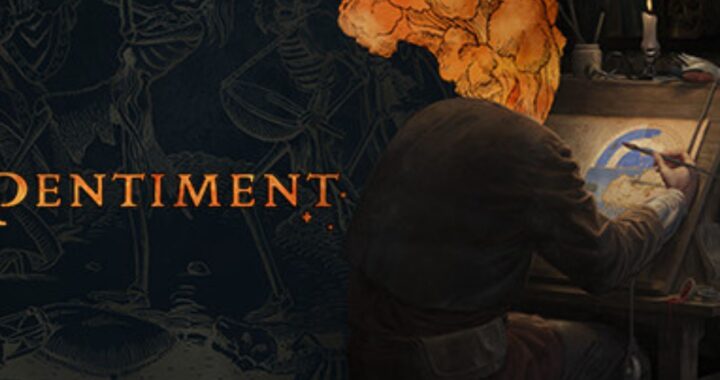
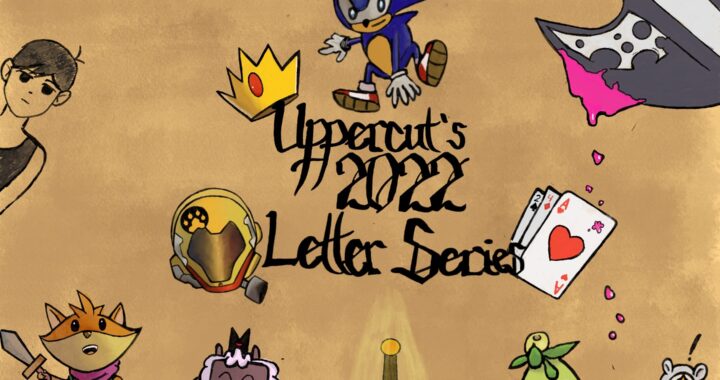
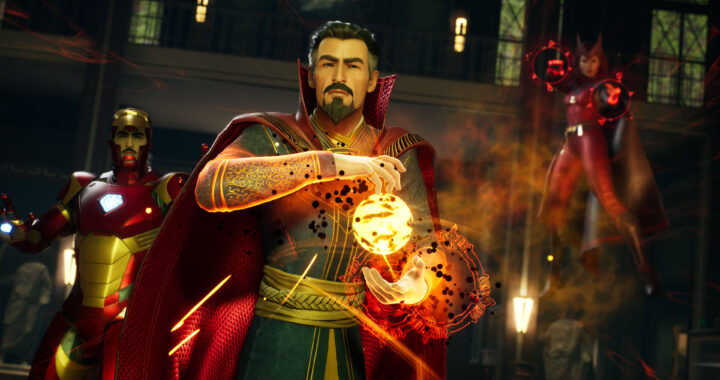

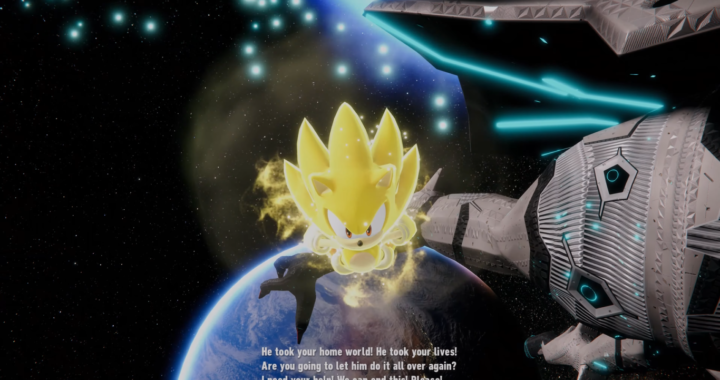
Citizen Sleeper is among my preferred games, I’am glad to see a well written about it and the emotions it can generate, thank you 🙂